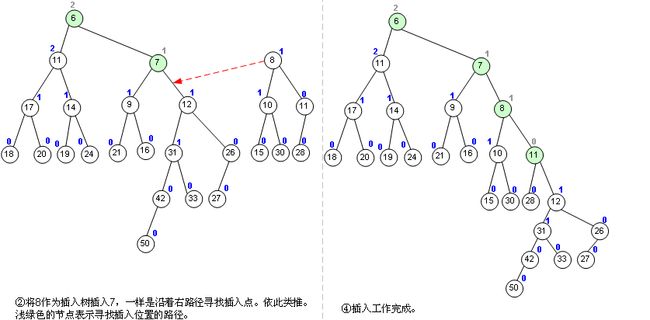- Visio 2021 常用快捷键总结
八年。。
笔记学习
下标:【“Ctrl”+“=”】上标:【“Ctrl”+“shift”+“=”】斜体:【“Ctrl”+“i”】加粗:【“Ctrl”+“b”】下划线:【“Ctrl”+“u”】删除本段光标之后所有内容:【“Ctrl”+“Delete”】删除本段光标之钱所有内容:【“Ctrl”+“Backspace”】另保存:【“F12”】复制:【“Ctrl”+鼠标拖拽】水平\垂直移动:【“Shift”+鼠标拖拽】放大缩小
- linux系统的目录结构
Petrus_shuai
linuxlinux系统目录结构
一.目录结构详述linux系统的目录结构最顶端是“/”,一切目录从根开始。我们可以通过tree命令得到根(/)下的目录结构。[root@linux01~]#tree-L1//├──bin->usr/binusr/libusr/lib64├──media├──mnt实际都是内存中的信息├──rootusr/sbinrc.d/init.d说明:/etc/init.d等价于/etc/rc.d/init.
- 2024金三银四必备:Java后端开发面试总结【25个技术专题】
2401_89790869
java面试开发语言
16、List和Map、Set的区别?17、数组和链表分别比较适合用于什么场景,为什么?18、说说ConcurrentHashMap19、Java中ArrayList和LinkedList区别?20、TreeMap(可排序)21、请用两个队列模拟堆栈结构?22、Map中的key和value可以为null?23、数据结构基础之双向链表24、HashMap的底层实现25、ConcurrentHashM
- C++: Dtrees:load(constg String& filepath, const String& nodeName)中nodeName参数含义
湫兮之风
c++c++开发语言算法
1.nodeName的作用当你保存模型时,整个决策树会被序列化到一个XML或YAML文件中。nodeName是加载时指定的一个逻辑路径,用于从文件中找到某个节点或子结构,而不是存储在文件中的字段。如果你不指定nodeName,OpenCV默认会尝试加载文件中根节点对应的模型。2.默认的行为如果你不指定nodeName,通常会加载文件的根节点:Ptrtree=cv::ml::DTrees::load
- 【SQL Server】超详细SQLServer日期转换、字符串、数学、聚合等常用函数大全(最新版)
web13093320398
面试学习路线阿里巴巴sqlserver数据库
文章目录一、字符串函数1、获取uuid2、字符串截取3、字符串拼接4、字符串去空格5、大小写转换6、格式化数字为字符串7、字符串替换、转换8、查找与定位9、ISNULL判空取值二、日期时间函数1、获取当前日期和时间2、提取日期部分3、DATENAME(datepart,date_expr)函数,返回指定日期的指定部分,返回字符串。获取年、月、日、星期、周数、时、分、秒4、DATEPART(date
- 数据结构-堆及堆排序
海棠蚀omo
数据结构算法
1.堆的定义堆(Heap)是一种数据结构,通常是一个完全二叉树。在堆中,每个节点都有一个与其相关的值,并且满足堆的性质。堆分为两种类型:大堆和小堆。大堆:在大堆中,对于每个非叶子节点,其值都大于或等于它的子节点的值。也就是说,根节点的值是整个堆中的最大值。小堆:与大堆相反,在小堆中,对于每个非叶子节点,其值都小于或等于它的子节点的值。根节点的值是整个堆中的最小值。左边的这幅图就是大堆,大堆中所有的
- MVC 架构学习笔记
disgare
架构mvc架构学习
MVC架构学习笔记Service与DAO层方法命名规约业务错误是用返回值来处理还是抛异常来处理Service与DAO层方法命名规约CRUD是指在做计算处理时的增加(Create)、读取查询(Retrieve)、更新(Update)和删除(Delete)几个单词的首字母简写。主要被用在描述软件系统中DataBase或者持久层的基本操作功能。对应这里的crud方法的命名,每个人有不同的实践。以下是阿里
- lxml.etree模式使用(一)
卫生纸不够用
python爬虫python前端javascript
fromlxmlimportetreefromcopyimportdeepcopydefprettyprint(element,**kwargs):print("/")xml=etree.tostring(element,pretty_print=True,**kwargs)print(xml.decode(),end='')#1.创建元素root=etree.Element("root")#2.
- python etree模块所有函数详解_09.XML处理之etree模块
weixin_39878401
pythonetree模块所有函数详解
本主题主要说明python的xml处理标准模块xml.etree的使用。xml.etree模块包含4个子模块,其中cElementTree是ElementTree的别名,已经不推荐使用。本主题主要包含内容:1.ElementInclude模块使用2.ElementPath模块使用3.ElementTree模块使用一、etree模块帮助importxml.etreehelp(xml.etree)He
- STM32 FreeROTS 任务创建和删除实验(静态方法)
雁过留声花欲落
STM32FreeRTOSstm32嵌入式硬件单片机
实验目标学会xTaskCreateStatic()和vTaskDelete()的使用:start_task:用来创建其他的三个任务。task1:实现LED1每500ms闪烁一次。task2:实现LED2每500ms闪烁一次。task3:判断按键KEY1是否按下,按下则删掉task1。看代码直接看代码修改,其余和动态创建和删除一样。STM32FreeRTOS任务创建和删除实验(动态方法)-CSDN博
- day 21
qq_50996930
C++学习专栏c++stl
C++11新特性智能指针右值引用和move语句auto关键字(根据初始化的值自动推导类型)lambda表达式for的范围遍历类和结构体中初始化列表nullptr代替null统一的初始化方式…智能指针:智能指针利用RAII思想将指针进行封装,使其在构造时分配内存,析构时释放内存,将动态分配的内存交给类对象管理,防止堆内存泄漏。常见的三种智能指针分别是unique_ptr,shared_ptr,wea
- 数据结构之链表(linked list)代码实现(小白轻松懂,C语言版)
Morandi_Chen
数据结构链表c语言
一、前言:链表的简单介绍链表(LinkedList)是一种重要的线性数据结构,它以节点(Node)的形式存储数据,每个节点通过指针(或引用)指向下一个节点,从而形成一个动态的数据链条。与数组不同,链表的内存分配并不连续,因此具有更灵活的插入和删除操作,但在随机访问元素时效率相对较低。链表通常分为单向链表(SinglyLinkedList)、双向链表(DoublyLinkedList)和循环链表(C
- 数据结构学习记录-队列
墨楠。
#C语言数据结构研习汇数据结构学习
队列的基本概念1、队列是操作受限的线性表2、队头:允许删除的一端3、队尾:允许插入的一端4、空队列:不含任何元素的空表5、特点:先进先出、FIFO6、应用场景:栈:解决括号匹配;逆波兰表达式求解;递归改非递归等等队列:公平排队,广度优先遍历等等队列的结构:队列的具体实现结构比较灵活,只要遵循先进先出原则即可。顺序表的方式实现,如果用数组表示,虽然尾插数据比较方便,但当头删数据时,还要移动剩余元素,
- Nginx日志分割(默认不分割)
后端
Nginx日志分割nginx日志默认不分割导致,单个日志文件,造成大文件,影响nginx程序运行。使用方法使用定时任务3023***cd/home/ccodsupport/nginxLog&&sudo./nginxLog.sh&>/dev/null修改nginx日志路径#!/bin/bash#设置Nginx日志目录logdir="/home/nginx/logs"#查找所有日志文件find"$lo
- 【第二天】零基础入门刷题Python-算法篇-数据结构与算法的介绍-五种常见的排序算法(持续更新)
Long_poem
排序算法算法python
提示:文章写完后,目录可以自动生成,如何生成可参考右边的帮助文档文章目录前言一、Python数据结构与算法的详细介绍1.Python中的常用的排序算法1.排序算法的介绍2.五种详细的排序算法代码总结前言提示:这里可以添加本文要记录的大概内容:第一天Python数据结构与算法的详细介绍第二天五种常见的排序算法提示:以下是本篇文章正文内容,下面案例可供参考一、Python数据结构与算法的详细介绍1.P
- python中lxml 库之 etree 使用详解
闲人陈二狗
python开发语言
目录一、etree介绍二、xpath解析html/xml1、第一步就是使用etree连接html/xml代码/文件。2、xpath表达式定位①xpath结合属性定位②xpath文本定位及获取③xpath层级定位④xpath索引定位⑤xpath模糊匹配一、etree介绍lxml库是Python中一个强大的XML处理库,简单来说,etree模块提供了一个简单而灵活的API来解析和操作XML/HTML文
- NPM 问题:ERESOLVE overriding peer dependency、Cannot read properties of null (reading ‘matches‘)
我命由我12345
前端-问题清单npm前端node.jsjava-eejavajavascriptjs
问题描述与处理策略1、问题描述npmWARNERESOLVEoverridingpeerdependencynpmWARNERESOLVEoverridingpeerdependencynpmWARNERESOLVEoverridingpeerdependencynpmWARNERESOLVEoverridingpeerdependencynpmWARNERESOLVEoverridingpeer
- Electron 项目运行问题:Electron failed to install correctly
我命由我12345
前端-问题清单electron前端javascriptvue.jsvue2js前端框架
问题描述与处理策略1、问题描述运行Electron项目,报如下错误Error:Electronfailedtoinstallcorrectly,pleasedeletenode_modules/electronandtryinstallingagain#翻译错误:Electron未能正确安装,请删除node_modules/electron,然后重试安装2、问题原因这个错误通常是由于Electro
- 服务器面试必备-redis面试题总结
前网易架构师-高司机
2025年最新-服务器面试经验2025年最新-数据库redis面试题
在服务器开发中,Redis的面试题所占的比重通常比较大,这是因为Redis在服务器开发中扮演着重要的角色。首先,Redis是一款开源的内存数据存储系统,它支持多种数据结构,并提供了丰富的操作指令,被广泛应用于各种场景,如缓存、消息队列、计数器、分布式锁等。因此,对于服务器开发人员来说,熟悉Redis的使用和原理是非常重要的。其次,Redis的高性能和高可扩展性使其成为处理高并发的关键技术之一。在服
- java经典面试题及答案:集合
心有猛虎嗷嗷叫
java面试题集合java
1、常用的集合有哪些?集合框架分为两类:Map和Collection,实现类分别有1)Map:HashMap、TreeMap、HashTable和ConcurrentHashMap2)Collection:List接口实现类有ArrayList和LinkedList;Set实现类有TreeSet和HashSet2、HashMap和HashTable的区别?1)HashMap是线程不安全的,Hash
- 数据结构与算法再探(五)贪心-双指针-滑动窗口
刀客123
数据结构与算法算法
贪心算法贪心算法是一种常用的算法设计策略,旨在通过局部最优选择来构建全局最优解。它的基本思想是:在每一步选择中,都选择当前看起来最优的选项,而不考虑后续的影响。贪心算法通常用于解决最优化问题,尤其是在某些特定条件下能够得到全局最优解的问题1、分发饼干455.分发饼干-力扣(LeetCode)假设你是一位很棒的家长,想要给你的孩子们一些小饼干。但是,每个孩子最多只能给一块饼干。对每个孩子i,都有一个
- 使用Sui索引框架支持自定义数据导入
Sui_Network
数据库web3大数据区块链网络云计算
Sui索引框架通过强大的数据导入框架提供对Sui链上数据的定制化访问。它允许任何相关软件,无论是在链上还是链下运行,收集原始链上数据和派生数据。利用Sui索引框架创建定制的数据流,开发者可以轻松构建响应链上事件的软件和产品。链上数据流的强大之处区块链数据结构旨在确保交易的完整性,这通常意味着它们没有针对整个历史的随机数据访问进行优化。然而,使用Sui索引框架构建的定制化数据流克服了这一限制,使开发
- C:JSON-C简介
技术探索者
#Cjson
介绍JSON-C是一个用于处理JSON格式数据的C语言库,提供了一系列操作JSON数据的函数。一、json参数类型typedefenumjson_type{json_type_null,json_type_boolean,json_type_double,json_type_int,json_type_object,json_type_array,json_type_string,}json_ty
- 【MySQL】CRUD增删改查操作
卡皮巴拉吖
mysql数据库
文章目录CRUD简介一、Creat新增1.单行数据全列插入2.单行数据全指定列插入3.多行数据指定列插入二、Retrieve检索1.全列查询--练习阶段最简单的查询:(在生产环境最好不要用!!)2.指定列查询3.结果去重查询4.where条件查询5.分页查询6.orderby排序三、Update修改四、Delete删除截断表【拓展】CRUD简介CRUD是对数据库中的记录进行的增删改查操作:Crea
- 安装栅栏-算法
晚夜微雨问海棠呀
算法scala
给定一个数组trees,其中trees[i]=[xi,yi]表示树在花园中的位置。你被要求用最短长度的绳子把整个花园围起来,因为绳子很贵。只有把所有的树都围起来,花园才围得很好。返回恰好位于围栏周边的树木的坐标。输入:points=[[1,1],[2,2],[2,0],[2,4],[3,3],[4,2]]输出:[[1,1],[2,0],[3,3],[2,4],[4,2]]importscala.c
- 开发经验及方法导读
盒子君~
#算法机器人系统架构
文章目录前言一、搭建工程开发环境专题三方库的调用方法二、代码程序设计专题1、C++开发知识树的阶段2、程序设计Kiss原则3、数据结构与语法规范4、CPP代码检查工具5、架构模式设计层(设计模式)6、代码重构7、代码设计模式--如何提高代码的运行效率、可读性、可维护性、健壮性?8、【C++RAII机制】将资源用类进行封装起来,做到资源创建即完成初始化,使用完资源即自动销毁9、源代码封装成库Lib的
- java long 空判断_Long类型null判断带值判断,null必须写在最前面
m0_67403143
前端htmlvue.jstypescriptjavascript
BEGIN;验证代码如下:publicstaticvoidmain(String[]args){Longid=null;System.out.println(test1(id));System.out.println(test2(id));System.out.println(test3(id));System.out.println(test4(id));}privatestaticString
- 《利用python进行数据分析》——3.1数据结构和序列——元组、列表、字典、集合——读书笔记
pillow_L
python数据分析
第3章Python的数据结构、函数和文件3.1数据结构和序列Python中常见的数据结构可以统称为容器。序列(如列表和元组)、映射(如字典)以及集合(set)是三类主要的容器。1.元组——tuple元组是一个固定长度,不可改变的Python序列对象。元组与列表一样,也是一种序列,唯一不同的是元组不能被修改(字符串其实也有这种特点)元组Tuple,一经初始化,就不能修改,没有列表List中的appe
- Python进阶实战:利用元组作为字典键的巧妙策略
Yori_22
Python编程python开发语言
在Python编程中,字典(dictionary)是一种非常强大且灵活的数据结构,它允许我们通过键(key)来快速访问和存储值(value)。通常,字典的键可以是任何不可变的数据类型,如整数、浮点数、字符串或元组。在这篇文章中,我们将深入探讨如何利用元组作为字典键的巧妙策略,特别是在处理复杂数据时,这种策略能够带来意想不到的便利和效率。一、元组作为字典键的基础在Python中,元组(tuple)是
- 数据结构(Java版)第二期:包装类和泛型
手握风云-
数据结构(Java版)数据结构java开发语言
目录一、包装类1.1.基本类型和对应的包装类1.2.装箱和拆箱1.3.自动装箱和自动拆箱二、泛型的概念三、引出泛型3.1.语法规则3.2.泛型的优点四、类型擦除4.1.擦除的机制五、泛型的上界5.1.泛型的上界的定义5.2.语法规则六、泛型方法6.1.定义语法6.2.交换方法的实例七、通配符包装类和泛型我们在Java语法中,我们在基本数据类型里面涉及过,但是我们在语法里面用不到,而在数据结构里面我
- rust的指针作为函数返回值是直接传递,还是先销毁后创建?
wudixiaotie
返回值
这是我自己想到的问题,结果去知呼提问,还没等别人回答, 我自己就想到方法实验了。。
fn main() {
let mut a = 34;
println!("a's addr:{:p}", &a);
let p = &mut a;
println!("p's addr:{:p}", &a
- java编程思想 -- 数据的初始化
百合不是茶
java数据的初始化
1.使用构造器确保数据初始化
/*
*在ReckInitDemo类中创建Reck的对象
*/
public class ReckInitDemo {
public static void main(String[] args) {
//创建Reck对象
new Reck();
}
}
- [航天与宇宙]为什么发射和回收航天器有档期
comsci
地球的大气层中有一个时空屏蔽层,这个层次会不定时的出现,如果该时空屏蔽层出现,那么将导致外层空间进入的任何物体被摧毁,而从地面发射到太空的飞船也将被摧毁...
所以,航天发射和飞船回收都需要等待这个时空屏蔽层消失之后,再进行
&
- linux下批量替换文件内容
商人shang
linux替换
1、网络上现成的资料
格式: sed -i "s/查找字段/替换字段/g" `grep 查找字段 -rl 路径`
linux sed 批量替换多个文件中的字符串
sed -i "s/oldstring/newstring/g" `grep oldstring -rl yourdir`
例如:替换/home下所有文件中的www.admi
- 网页在线天气预报
oloz
天气预报
网页在线调用天气预报
<%@ page language="java" contentType="text/html; charset=utf-8"
pageEncoding="utf-8"%>
<!DOCTYPE html PUBLIC "-//W3C//DTD HTML 4.01 Transit
- SpringMVC和Struts2比较
杨白白
springMVC
1. 入口
spring mvc的入口是servlet,而struts2是filter(这里要指出,filter和servlet是不同的。以前认为filter是servlet的一种特殊),这样就导致了二者的机制不同,这里就牵涉到servlet和filter的区别了。
参见:http://blog.csdn.net/zs15932616453/article/details/8832343
2
- refuse copy, lazy girl!
小桔子
copy
妹妹坐船头啊啊啊啊!都打算一点点琢磨呢。文字编辑也写了基本功能了。。今天查资料,结果查到了人家写得完完整整的。我清楚的认识到:
1.那是我自己觉得写不出的高度
2.如果直接拿来用,很快就能解决问题
3.然后就是抄咩~~
4.肿么可以这样子,都不想写了今儿个,留着作参考吧!拒绝大抄特抄,慢慢一点点写!
- apache与php整合
aichenglong
php apache web
一 apache web服务器
1 apeche web服务器的安装
1)下载Apache web服务器
2)配置域名(如果需要使用要在DNS上注册)
3)测试安装访问http://localhost/验证是否安装成功
2 apache管理
1)service.msc进行图形化管理
2)命令管理,配
- Maven常用内置变量
AILIKES
maven
Built-in properties
${basedir} represents the directory containing pom.xml
${version} equivalent to ${project.version} (deprecated: ${pom.version})
Pom/Project properties
Al
- java的类和对象
百合不是茶
JAVA面向对象 类 对象
java中的类:
java是面向对象的语言,解决问题的核心就是将问题看成是一个类,使用类来解决
java使用 class 类名 来创建类 ,在Java中类名要求和构造方法,Java的文件名是一样的
创建一个A类:
class A{
}
java中的类:将某两个事物有联系的属性包装在一个类中,再通
- JS控制页面输入框为只读
bijian1013
JavaScript
在WEB应用开发当中,增、删除、改、查功能必不可少,为了减少以后维护的工作量,我们一般都只做一份页面,通过传入的参数控制其是新增、修改或者查看。而修改时需将待修改的信息从后台取到并显示出来,实际上就是查看的过程,唯一的区别是修改时,页面上所有的信息能修改,而查看页面上的信息不能修改。因此完全可以将其合并,但通过前端JS将查看页面的所有信息控制为只读,在信息量非常大时,就比较麻烦。
- AngularJS与服务器交互
bijian1013
JavaScriptAngularJS$http
对于AJAX应用(使用XMLHttpRequests)来说,向服务器发起请求的传统方式是:获取一个XMLHttpRequest对象的引用、发起请求、读取响应、检查状态码,最后处理服务端的响应。整个过程示例如下:
var xmlhttp = new XMLHttpRequest();
xmlhttp.onreadystatechange
- [Maven学习笔记八]Maven常用插件应用
bit1129
maven
常用插件及其用法位于:http://maven.apache.org/plugins/
1. Jetty server plugin
2. Dependency copy plugin
3. Surefire Test plugin
4. Uber jar plugin
1. Jetty Pl
- 【Hive六】Hive用户自定义函数(UDF)
bit1129
自定义函数
1. 什么是Hive UDF
Hive是基于Hadoop中的MapReduce,提供HQL查询的数据仓库。Hive是一个很开放的系统,很多内容都支持用户定制,包括:
文件格式:Text File,Sequence File
内存中的数据格式: Java Integer/String, Hadoop IntWritable/Text
用户提供的 map/reduce 脚本:不管什么
- 杀掉nginx进程后丢失nginx.pid,如何重新启动nginx
ronin47
nginx 重启 pid丢失
nginx进程被意外关闭,使用nginx -s reload重启时报如下错误:nginx: [error] open() “/var/run/nginx.pid” failed (2: No such file or directory)这是因为nginx进程被杀死后pid丢失了,下一次再开启nginx -s reload时无法启动解决办法:nginx -s reload 只是用来告诉运行中的ng
- UI设计中我们为什么需要设计动效
brotherlamp
UIui教程ui视频ui资料ui自学
随着国际大品牌苹果和谷歌的引领,最近越来越多的国内公司开始关注动效设计了,越来越多的团队已经意识到动效在产品用户体验中的重要性了,更多的UI设计师们也开始投身动效设计领域。
但是说到底,我们到底为什么需要动效设计?或者说我们到底需要什么样的动效?做动效设计也有段时间了,于是尝试用一些案例,从产品本身出发来说说我所思考的动效设计。
一、加强体验舒适度
嗯,就是让用户更加爽更加爽的用你的产品。
- Spring中JdbcDaoSupport的DataSource注入问题
bylijinnan
javaspring
参考以下两篇文章:
http://www.mkyong.com/spring/spring-jdbctemplate-jdbcdaosupport-examples/
http://stackoverflow.com/questions/4762229/spring-ldap-invoking-setter-methods-in-beans-configuration
Sprin
- 数据库连接池的工作原理
chicony
数据库连接池
随着信息技术的高速发展与广泛应用,数据库技术在信息技术领域中的位置越来越重要,尤其是网络应用和电子商务的迅速发展,都需要数据库技术支持动 态Web站点的运行,而传统的开发模式是:首先在主程序(如Servlet、Beans)中建立数据库连接;然后进行SQL操作,对数据库中的对象进行查 询、修改和删除等操作;最后断开数据库连接。使用这种开发模式,对
- java 关键字
CrazyMizzz
java
关键字是事先定义的,有特别意义的标识符,有时又叫保留字。对于保留字,用户只能按照系统规定的方式使用,不能自行定义。
Java中的关键字按功能主要可以分为以下几类:
(1)访问修饰符
public,private,protected
p
- Hive中的排序语法
daizj
排序hiveorder byDISTRIBUTE BYsort by
Hive中的排序语法 2014.06.22 ORDER BY
hive中的ORDER BY语句和关系数据库中的sql语法相似。他会对查询结果做全局排序,这意味着所有的数据会传送到一个Reduce任务上,这样会导致在大数量的情况下,花费大量时间。
与数据库中 ORDER BY 的区别在于在hive.mapred.mode = strict模式下,必须指定 limit 否则执行会报错。
- 单态设计模式
dcj3sjt126com
设计模式
单例模式(Singleton)用于为一个类生成一个唯一的对象。最常用的地方是数据库连接。 使用单例模式生成一个对象后,该对象可以被其它众多对象所使用。
<?phpclass Example{ // 保存类实例在此属性中 private static&
- svn locked
dcj3sjt126com
Lock
post-commit hook failed (exit code 1) with output:
svn: E155004: Working copy 'D:\xx\xxx' locked
svn: E200031: sqlite: attempt to write a readonly database
svn: E200031: sqlite: attempt to write a
- ARM寄存器学习
e200702084
数据结构C++cC#F#
无论是学习哪一种处理器,首先需要明确的就是这种处理器的寄存器以及工作模式。
ARM有37个寄存器,其中31个通用寄存器,6个状态寄存器。
1、不分组寄存器(R0-R7)
不分组也就是说说,在所有的处理器模式下指的都时同一物理寄存器。在异常中断造成处理器模式切换时,由于不同的处理器模式使用一个名字相同的物理寄存器,就是
- 常用编码资料
gengzg
编码
List<UserInfo> list=GetUserS.GetUserList(11);
String json=JSON.toJSONString(list);
HashMap<Object,Object> hs=new HashMap<Object, Object>();
for(int i=0;i<10;i++)
{
- 进程 vs. 线程
hongtoushizi
线程linux进程
我们介绍了多进程和多线程,这是实现多任务最常用的两种方式。现在,我们来讨论一下这两种方式的优缺点。
首先,要实现多任务,通常我们会设计Master-Worker模式,Master负责分配任务,Worker负责执行任务,因此,多任务环境下,通常是一个Master,多个Worker。
如果用多进程实现Master-Worker,主进程就是Master,其他进程就是Worker。
如果用多线程实现
- Linux定时Job:crontab -e 与 /etc/crontab 的区别
Josh_Persistence
linuxcrontab
一、linux中的crotab中的指定的时间只有5个部分:* * * * *
分别表示:分钟,小时,日,月,星期,具体说来:
第一段 代表分钟 0—59
第二段 代表小时 0—23
第三段 代表日期 1—31
第四段 代表月份 1—12
第五段 代表星期几,0代表星期日 0—6
如:
*/1 * * * * 每分钟执行一次。
*
- KMP算法详解
hm4123660
数据结构C++算法字符串KMP
字符串模式匹配我们相信大家都有遇过,然而我们也习惯用简单匹配法(即Brute-Force算法),其基本思路就是一个个逐一对比下去,这也是我们大家熟知的方法,然而这种算法的效率并不高,但利于理解。
假设主串s="ababcabcacbab",模式串为t="
- 枚举类型的单例模式
zhb8015
单例模式
E.编写一个包含单个元素的枚举类型[极推荐]。代码如下:
public enum MaYun {himself; //定义一个枚举的元素,就代表MaYun的一个实例private String anotherField;MaYun() {//MaYun诞生要做的事情//这个方法也可以去掉。将构造时候需要做的事情放在instance赋值的时候:/** himself = MaYun() {*
- Kafka+Storm+HDFS
ssydxa219
storm
cd /myhome/usr/stormbin/storm nimbus &bin/storm supervisor &bin/storm ui &Kafka+Storm+HDFS整合实践kafka_2.9.2-0.8.1.1.tgzapache-storm-0.9.2-incubating.tar.gzKafka安装配置我们使用3台机器搭建Kafk
- Java获取本地服务器的IP
中华好儿孙
javaWeb获取服务器ip地址
System.out.println("getRequestURL:"+request.getRequestURL());
System.out.println("getLocalAddr:"+request.getLocalAddr());
System.out.println("getLocalPort:&quo



